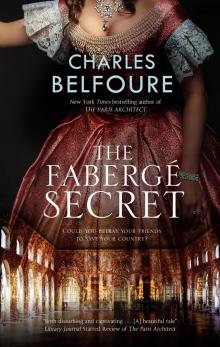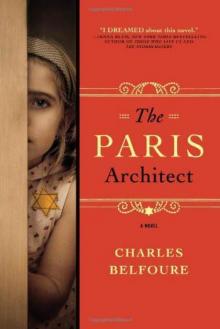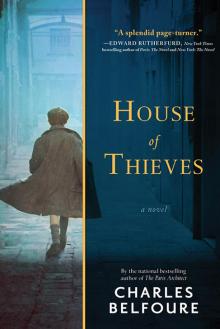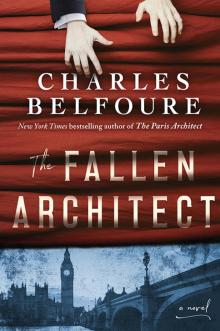- Home
- Charles Belfoure
The Fabergé Secret Page 4
The Fabergé Secret Read online
Page 4
Dimitri shook his head in disbelief. Who would want to kill the Tsar and his family in such a horrible way? What had Nicholas done to deserve this?
FOUR
‘Welcome home, Mistress Katya.’
Doctor Katya Alexandrovna Golitsyn was so glad to be home. When the droshky pulled in front of the great house on Konnogvardeysky Boulevard, her heart had soared. The three-story yellow stone mansion had eleven tall windows overlooking a little park, and all were ablaze with light like a welcoming beacon.
The ancient wrinkled face of Sasha, the family servant standing in the glowing entrance hall in his rumpled sack of a black suit, was a cherished sight after her long journey. There had been two kinds of slaves, or serfs, when they were emancipated back in 1861: field serfs who worked the land; and house serfs working as servants. But to gain their freedom, house serfs had to pay their master thirty rubles, or guarantee personal service for two more years. Sasha chose the latter and had stayed with the family now for fifty-two years. He was as loyal to Katya as he had been to her grandfather.
‘My Sasha,’ she cried out, and gave him a kiss on the cheek. Sasha ordered the coachman standing behind her to bring the luggage into the entrance hall. As she was taking off her coat, a black and white cat bounded up to her.
‘Noskey missed you very much. He slept on your pillow every night,’ Sasha said.
‘My darling Noskey!’
Katya swooped up the cat and cuddled him, pressing him against her face. The smell and feel of his soft fur were wonderful after so long a trip. She and her friend, Dr Clara Deverenko, had been in Bucharest for a medical conference on infections of the stomach lining during the week after Easter. They enjoyed the lectures, despite the fact that they were the only female doctors who attended. While Russia could proudly boast that it had more women lawyers and doctors than any other European country, the male doctors who came from all over Europe were unimpressed. They made jest of female doctors and treated them as they would servant girls, often implying that a woman didn’t have the brains or disposition to be a doctor. Clara, who was quite pretty, had an especially hard time fending off advances and lewd remarks. But despite the insulting treatment, the trip had been worth it.
‘You’re just in time for dinner, Mistress Katya,’ Sasha said.
‘There’s my doctor!’ boomed a voice from the top of the staircase.
Katya’s father, Aleksandr Vassilievitch Golitsyn, marched down the marble steps of the great curving staircase. A stout pink-faced man in his fifties, he was dressed in a black suit with a waistcoat. He had a reddish-brown beard and held a cigarette in an ivory holder.
‘Katya, my love!’ he cried out. He threw his arms around his daughter, giving her a long embrace. She loved the smell of his sweet-flavored Turkish cigarettes that hung about him, as if it were a cologne.
‘Hello, my delightful papa.’ From the great dining room to her right came her sister, Yelena, a pale girl of twenty-five. She held her four-year-old, Irina, by the hand. Her husband, Fydor Erorovitch, a partner in her father’s textile business, followed them. Yelena and Fydor lived with them in the great house. Then came Boris, her eighteen-year-old brother, in his black high-school uniform with high collar. Waddling along with them was Valentina, the family’s nyanya, holding Natasha, Yelena’s four-month-old infant. Katya rushed into the nanny’s arms, then kissed the baby on the head. This devoted, illiterate, superstitious peasant had taken care of every child in the family for the last forty years, wiping noses, telling bedtime stories, and keeping them in line. Only for the most serious offenses of behavior did she consult the parents. Since Katya’s mother had died from cholera when she was seven, Valentina had been her real mother.
‘My dear nyanya, how are you?’
‘Ah, my knees again. My little Katya, could you take a look at them after the meal?’ One of the drawbacks of being the doctor in the family was that everyone wanted medical attention.
Another person emerged into the grand entry. Ivan Pavlovitch Telegin also worked for her father, as the chief financial officer. Katya knew immediately why he was here tonight, as well as many other nights.
‘So good to see you, Katya Alexandrovna. I hope you had a pleasant journey, the train ride from Bucharest to St Petersburg is very long.’ Ivan clicked his heels then bowed to kiss her hand.
‘Yes, I’m quite worn out,’ Katya replied, almost withdrawing her hand before Ivan completed his kiss.
Though incredibly proud of his daughter, Aleksandr Vassilievitch thought it was time for her to get married. Ivan was the main candidate for a husband, but Katya would have none of it. He was cultured and intelligent, but she had no desire to raise a family yet. She wasn’t her sister. Her profession came first.
‘I’m starving,’ Katya added with a laugh. ‘I’ve had nothing but train-station food.’ Her father took her arm and escorted her, leading the family into the big, bright dining room lined with dark green marble paneling.
Valentina handed the baby to Sonya, the family wet-nurse. Unlike most nyanyas, Valentina was welcome to eat at the table with the family.
‘Time for the little one’s dinner, too,’ Valentina said. Looking at Sonya’s huge breasts, Katya could imagine her feeding an entire regiment of the Tsar’s Guard.
‘Sit down, let’s eat,’ came the command from her father.
There on the sideboard was a feast of zakuski, fresh caviar, herring filets, smoked sturgeon, balyk, suckling pig, roast chicken, cucumbers in brine, cold salmon, and pâtés of meat and cabbage. Bottles of iced vodka, ordinary white to peppered, were also in abundance. For a Russian, iced vodka had to have needles of ice formed inside the bottle not merely chilled in an ice bucket the way the French did. The family chattered away over the meal.
‘There’s a performance of The Seagull next week, would you allow me the pleasure of taking you, Katya Alexandrovna?’ Ivan asked in an eager tone of voice.
‘What night would that be, Ivan Pavlovitch?’
‘Wednesday, but it’s playing every night next week, if that’s more convenient for you.’
‘I’m so sorry, I must work the evening shift at the hospital. Come to think of it, I work every night next week.’
Katya washed down each mouthful of food with a glass of vodka, sending a bolt of fire down her throat and into the stomach. Vodka, her father taught her, called for food, and food called for vodka.
‘The vodka in Bucharest was like rubbing alcohol. So good to taste the world’s best vodka again,’ Katya said, raising her glass. The family lifted their glasses in agreement.
The servants dressed in black suits with white cravats and gloves brought in the main courses, including her favorite quail pies with truffles à la Perigueux. Like all wealthy Russian households, hers boasted a French chef. The wines were French except for one fine Crimean vintage.
‘What did you think of the Somov exhibit, Katya Alexandrovna?’ asked Ivan.
‘It didn’t impress me for some reason,’ she replied with a frown, not wanting to encourage him. She took a big bite of her quail pie.
Coffee was served after the dessert of pineapple jelly whipped with champagne and topped with fruit. The after-dinner conversation always dwelt on the same topic, St Petersburg versus Moscow.
‘St Petersburg is the new Russia, the “the window on Europe,”’ Aleksandr Vassilievitch boasted. ‘The Muscovites are coarse and puerile. And St Petersburg definitely has the best theater.’
‘They may have Chekhov, but we have the greatest ballerinas, Pavlova and Kschessinska,’ said Yelena.
‘They hate our Western ways,’ added Katya, blowing a smoke ring into the air. Her niece, Irina, tried to poke her hand through it. ‘They say we’re Western, not Russian, hah! We are the new Russians – with new ideas.’
‘And we have the most creative painters,’ Ivan added enthusiastically.
‘We love the arts more than they,’ said her father, who winked at Katya. The new patrons of arts in Russia today were the great indu
strialists like her father. They supported the actors, painters, poets, composers, and dancers in both St Petersburg and Moscow. Aleksandr Vassilievitch was the second largest textile industrialist in Russia after the Morozov family. As a young man, he had gone abroad and studied the textile industry in Manchester, England. He’d brought back new ideas and machinery to advance the Russian textile industry, turning the modest business his father, Pyotr, had begun into a great fortune. He was also proud that he treated his workers better and paid them more than the Morozovs. Katya wanted to believe she had a part in that decision.
‘And does Moscow have the Pavlov State Medical University? No!’ he added.
A cheer went up at his pronouncement. It was the first medical college for women in the Empire, and Katya was in its first graduation class in 1900. Unlike most Russian fathers, Aleksandr Vassilievitch believed in educating women beyond high school. Both Katya and Yelena had sharp intellects which he insisted on expanding, though her sister’s main goal in life was to be a mother. Their brother, Boris, was also very smart, but he was lazier than a peasant, which constantly infuriated their father.
It was getting late, and Valentina gathered up little Irina for bed. She fell asleep in the nyanya’s arms as she was carried up the grand staircase.
Her father ordered Boris upstairs to finish his schoolwork. Yelena and Fydor bid them good night. Ivan Pavlovitch also took his leave, extracting a reluctant promise from Katya to go to the Théatre Français next month. Before Katya started the climb, she hugged her father good night.
‘Come stay with me for a bit in the study,’ asked her father in an almost pleading tone. ‘I missed you so.’
Katya was exhausted, but she followed him to the great mahogany-paneled library with the polished parquet floors. The fire was crackling in the wide fireplace. Aleksandr Vassilievitch lit a cigarette for his daughter and for himself, then plopped down in his tall leather chair behind his desk. With a full stomach of food and vodka, Katya collapsed into a chair. Many times, she had sat here talking with her father into the night. They both found each other good company, trading stories, jokes, and opinions about everything under the Russian sun. Katya remembered fondly how grown-up she felt the first time her father offered her a cigarette. Aleksandr Vassilievitch loved his family, Russia, and his textile business, in that order.
‘Back to the clinic tomorrow, eh? Dr Trofimov called this morning, wondering where you were.’
‘We were a bit late leaving Kishinev. Bad business there, they say. Fifty dead and over five hundred injured in a pogrom.’ Katya blew a smoke ring and watched it disappear.
‘The Jews are a smart but unfortunate people,’ mused Aleksandr Vassilievitch, picking out bits of tobacco from his tongue.
Katya nodded, tossed her cigarette into the fire, then stood up to kiss her father good night.
FIVE
At exactly 9 p.m., the Grand Master of Ceremonies struck his ebony staff embossed in gold with the double-headed eagle three times. The taps on the floor of the Great Gallery in the Catherine Palace always sounded like pistol reports. ‘Their Imperial Majesties!’ he cried out.
A complete hush fell over the three thousand people milling about in the gigantic ball room. All men bowed and ladies curtsied in unison. Dimitri, wearing formal white tie and tails, bedecked with medals for service to Russia, surveyed the crowd and smiled. The beauty and splendor of the scene were magical to him. He had been to hundreds and hundreds of Imperial Balls in all the palaces, but the incredible spectacle always sent a bolt of excitement through him. Before him stood Lara and thousands of women with jewels covering every neck, head, ear, wrist, and finger. The men also wore diamonds on their cuff links and shirt studs. Because the room was lined with fourteen-foot-high mirrors on both sides, it gave the impression that the ballroom went on forever, and that there were thousands more guests.
As Nicholas and Alexandra appeared, and the orchestra struck up ‘God Save the Tsar,’ Dimitri saw that his friend was wearing his usual public expression of smiling warmth and confidence – despite the fact that he and his entire family could have been murdered by plague less than two months ago. Dimitri was still terribly shaken by the assassination attempt, which had been kept secret from the public. What an incredibly evil thing to do! For weeks, he couldn’t help thinking about it. No one could hate the Tsar that much. A madman must have sent that cloth to the palace. Who else would do such a heinous act? Dimitri was impressed that Nicky’s face didn’t betray a single trace of worry. He looked the brave supreme leader he was.
Alexandra, whom Nicky told nothing of the incident, wore her usual severe expression but looked magnificent. She was wearing a silver brocade gown embroidered with gold thread. Adorning her neck was the Imperial Rivière Necklace, with thirty-six diamonds totaling 470 carats; the largest diamond necklace in the world. The Tsar was in the uniform of the Hussar Guards, a crimson jacket and black trousers with a red stripe. As tradition dictated, the emperor and empress led a polonaise, then one quadrille. After finishing the dances, the Imperial Couple moved through the ballroom to greet guests. Dimitri saw that this was an excruciating experience for Alexandra.
‘Here come the blotches,’ announced Princess Betsey.
Alexandra’s skin always broke out in red blotches when she had to greet the Court. Her beautiful face had blotches on her cheeks and forehead, as well as parts of her arms. She barely said a word to the guests and scarcely looked at them, making her seem cold and haughty.
‘Still have to admit she’s got great taste in clothes – blotchy skin and all,’ Lara said.
A mazurka began, Dimitri bowed to Princess Betsy, and they joined the floor. As usual, Lara had no lack of partners, and she chose Grand Duke Michael, the Tsar’s brother. As Betsey chattered away, Dimitri smiled but blanked out everything she said. What a lot of nonsense, he thought. How could he have been in love with this woman for almost a year? These damn men and women never seemed to have an intelligent thought in their heads. Then he let out a sigh; this was the privileged world of outrageous vanity and mendacity into which he was born and, there was no escape. But how nice it would be to have a real conversation with someone for a change!
It was very unusual to have a ball out of season, especially in June and at the Catherine Palace. Normally, the Imperial Family would be spending the month at Spała, their beautiful estate in central Poland. Dimitri had heard through the rumor mill that the Minister of the Interior von Plehve urged the Tsar to hold a ball to invite ambassadors and dignitaries from the foreign countries who’d criticized Russia about the Kishinev incident in order to placate them. Dimitri could make out who those people were in the ballroom. Many were from the Asiatic countries like China and Siam. Except for their eyes and darker tone of skin color, they looked exactly like everyone else. Some ambassadors were being introduced to the Imperial Couple. Dimitri noticed that all the Court women were displaying even more décolletage than usual, in defiance of the Tsarina.
Lara had made sure the neckline of her scarlet and gold gown was especially low tonight. She had already danced two mazurkas and four waltzes before she caught up with her husband, who had finished his dance with the Countess Trigorin.
‘And how is our beautiful Countess Trigorin tonight … you wicked boy?’
The Countess was Dimitri’s current lover and knew his wife didn’t care just as he didn’t care about her affairs – as long as they were done with discretion.
‘You should tell Prince Gayev to resist the temptation to put his hand on your ass when you’re dancing, no matter how perfect it is.’
Lara shrieked with laughter, putting her scarlet-gloved hand over her mouth to stifle the outburst. ‘Oh yes, I’ll be sure to do that. But several of my partners have already beat him to it.’
Dimitri gave a sardonic smile. At least his wife had a sense of humor to match her beauty. It was one of the very few pleasant things left in their marriage; at times they amused each other. On the dance floor you
ng officers with brilliant decorations on their tunics whirled young girls around on the polished wood floor. The officers had to make sure their spurs didn’t get caught up in their partners’ gowns in the excitement. Couples seemed to glide on air, producing a brilliant effect of color mixed with sparkling of diamonds, rubies, and emeralds. They looked as though they had their heads up in the stars and were soaring in their own separate universe. To Dimitri, they seemed to have wings on their heels. That was the feeling he’d had at that wonderful age. The dancers’ faces were flushed pink from exertion.
Along the mirrored and gilt walls were the old doyennes in white satin gowns flitting their fans and watching the goings-on. These crones were always sizing up the young girls and gossiping about their chances for a choice marriage, like men examining the stock at a horse auction. At midnight, a buffet supper would be served in an adjoining room of the enfilade. The luxurious feast would have red, black, and gray caviar, blini with sour cream, lamb, roast beef, and chicken. Vodka and champagne would be chilled in blocks of ice.
‘So many commoners invited tonight,’ Lara said, whipping her scarlet and gold fan about. As usual, she looked stunning. Her blonde hair was decorated with a diadem set with two rows of diamonds. A ferronière with a single diamond of one square inch crossed her forehead.
‘But extremely rich commoners,’ replied Dimitri.
Before Lara could reply, she was swept onto the floor by Sir John Sinclair, a British diplomat to the Imperial Court. Dimitri looked to his right and saw General Zamansky, an eighty-year-old in the Lancers Regiment.
‘Damn hot in here, Prince Dimitri,’ bellowed the general.
‘Yes, it is rather uncomfortable.’
‘The Tsar invites too many damn people, like all these diplomatic fellows. Useless bunch, those. I was talking to one, and he had the gall to say …’
Not wanting to be stuck talking to an old windbag like Zamansky, Dimitri bowed and excused himself. He walked into the long corridor that connected the ballroom to other rooms of the enfilades. Stationed at ten-yard intervals like statues along the corridor were soldiers of the Chevalier Guards with silver breastplates and eagle-crested helmets. On one side of the corridor were tall French doors that opened onto a park. Dimitri took a cigarette from his new Fabergé case and walked out. The night air was cool and refreshing after the closeness of the great ballroom. The fragrance of the poplars and roses was quite strong, and the light from the Catherine Palace cast a golden glow over the park’s lawn. He was surprised to see a woman standing by herself. It was odd to see a young woman just standing around, looking off into the moonless night, and not in perpetual motion on the dance floor. He decided to stroll over.

 The Fabergé Secret
The Fabergé Secret The Paris Architect: A Novel
The Paris Architect: A Novel House of Thieves
House of Thieves The Fallen Architect
The Fallen Architect